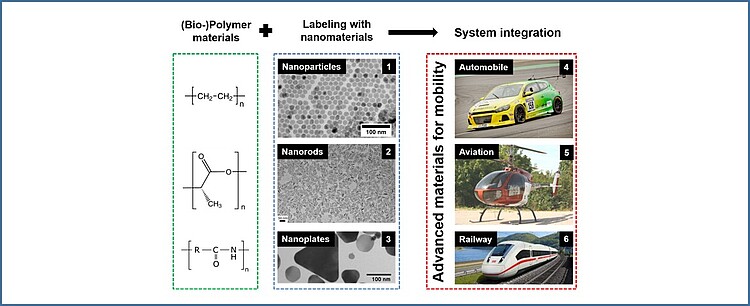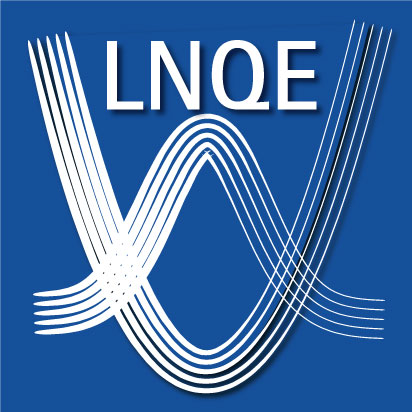(Bio-)Polymer materials with tailored nano-labelling used as advanced integrated systems for future mobility

| Leitung: | Supervisor: Prof. Dr.-Ing. Andrea Siebert-Raths, HsH, Institute for Bioplastics and Biocomposites. Co-Supervisor: Prof. Dr. Nadja C. Bigall, LUH, Institute of Physical Chemistry and Electrochemistry |
| Team: | Sarina Schulte |
| Jahr: | 2021 |
In this project novel (bio-)polymer materials with tailored nano-labelling are developed for future mobility including the integration of digital transformation in the material system. The materials for mobility are highly diverse and can cover exterior and interior components for the automotive, aviation and railway sector where reliable and sustainable material solutions are favored. External influences such as temperature change, pressure load or moisture absorption can induce material failure even before the expected life span ends. In reality, a combination of several external factors affects the component of interest at the same time requiring bi- or multi-labeled materials. Depending on the specifications of the target component the (bio-)polymer matrix has to be selected and nanomaterials with desired morphology and properties (e.g. thermal or electrical conduc- tivity, magnetic, antistatic, antibacterial or ultraphobic properties) have to be designed. One key task of the project is the integration of the nanomaterial (e.g. nanoparticles, nanorods or nanoplates) into the (bio-)polymer matrix without loss of its function by convenient 2D or 3D assembling strategies. By this, the nanomaterials are integrated into the macroscopic device aiming at large area arrangements which are able to detect material failure and give information to a signal receiver. In summary, this interdisciplinary project combines material science, chemistry and nanotechnology for generating novel components for the mobility sector.
Image sources:
1+2) LUH/PCI
3) Sigma-Aldrich Corporation
4) Four Motors GmbH
5) edm aerotec GmbH
6) Deutsche Bahn AG
In this project novel (bio-)polymer materials with tailored nano-labelling are developed for future mobility including the integration of digital transformation in the material system. The materials for mobility are highly diverse and can cover exterior and interior components for the automotive, aviation and railway sector where reliable and sustainable material solutions are favored. External influences such as temperature change, pressure load or moisture absorption can induce material failure even before the expected life span ends. In reality, a combination of several external factors affects the component of interest at the same time requiring bi- or multi-labeled materials. Depending on the specifications of the target component the (bio-)polymer matrix has to be selected and nanomaterials with desired morphology and properties (e.g. thermal or electrical conduc- tivity, magnetic, antistatic, antibacterial or ultraphobic properties) have to be designed. One key task of the project is the integration of the nanomaterial (e.g. nanoparticles, nanorods or nanoplates) into the (bio-)polymer matrix without loss of its function by convenient 2D or 3D assembling strategies. By this, the nanomaterials are integrated into the macroscopic device aiming at large area arrangements which are able to detect material failure and give information to a signal receiver. In summary, this interdisciplinary project combines material science, chemistry and nanotechnology for generating novel components for the mobility sector.
Image sources:
1+2) LUH/PCI
3) Sigma-Aldrich Corporation
4) Four Motors GmbH
5) edm aerotec GmbH
6) Deutsche Bahn AG






